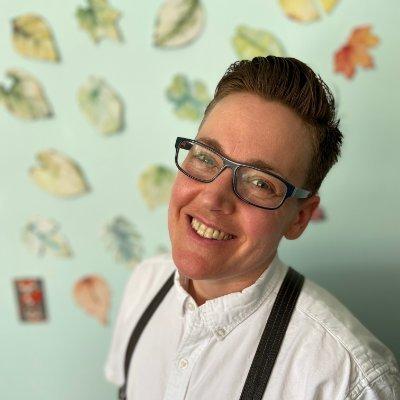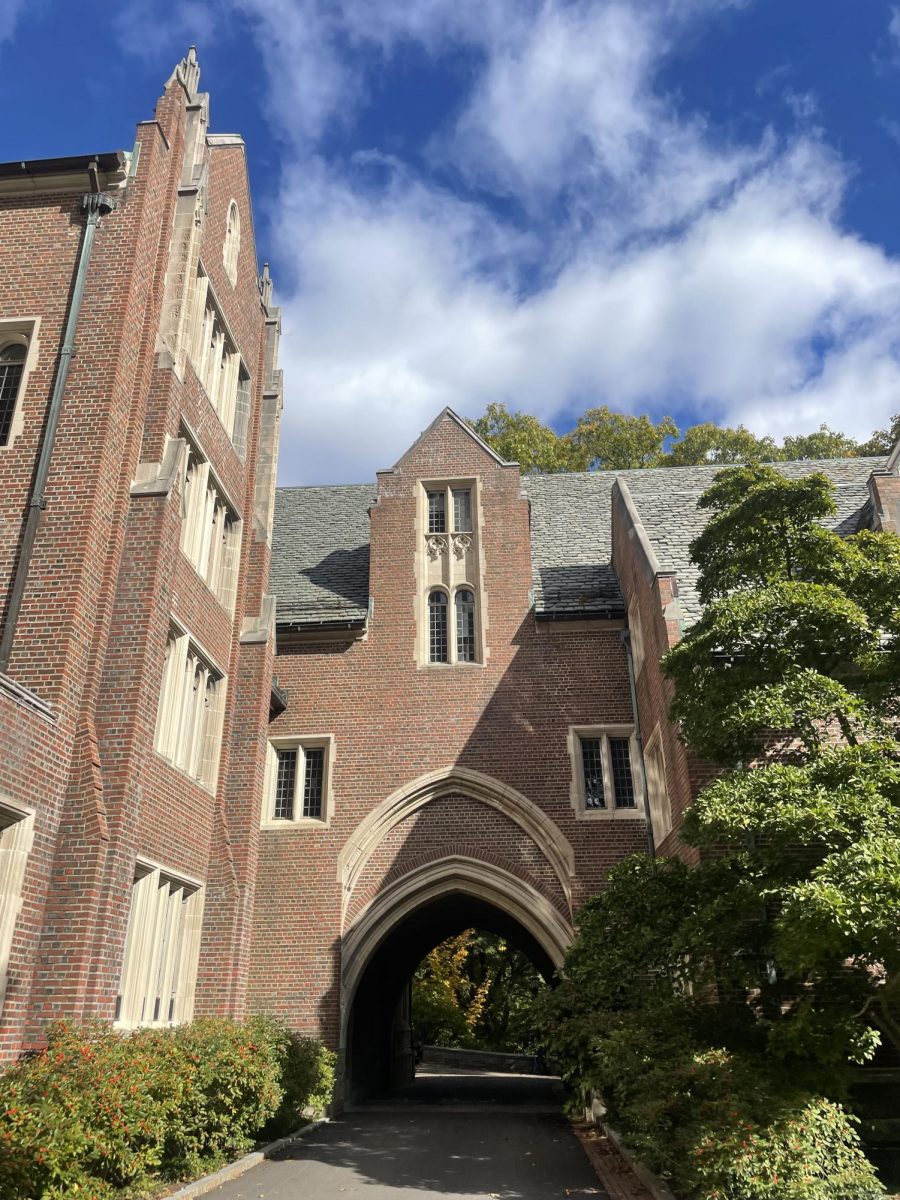Recently, Professor Kaleb Goldschmitt became the first non-binary, trans professor to gain tenure at Wellesley College, and is the only tenured professor from the arts this academic year. They are currently an assistant professor of music and specialize in ethnomusicology.
However, their path to tenure was not easy. As they reflected, the tenure system was created as a way to protect academic freedom. However, in the last 10 years, the tenure process has evolved into a difficult evaluation process professors choose to go through to achieve job security. Due to the significant wage gap between tenured and untenured professors, many are pressured to pursue the former in order to achieve financial stability. Thus, this process creates stress for many professors like Goldschmitt.
“When the bar for getting that job security has been increasing across all colleges and universities in this country, Wellesley expects stellar teaching, stellar research, stellar service,” they said. “They [the College] want top marks and all of it.”
In particular, the process of receiving SEQs has caused Professor Goldschmitt much stress.
“My first semester, I thought I got the best teaching evaluations of my career,” they said. “And I thought these were great, you know, like look at how much they’re praising me. And [my colleagues are] like, ‘No, no, no, you don’t understand this place … this is really worrisome.’ And so immediately I got a very clear understanding that not only did I have to be as good as I already was, I had to be Wellesley good.”
Furthermore, because Wellesley places heavy emphasis on student’s learning experiences, students’ evaluations of their professors plays an important role in their careers.
“The way that the teaching SEQs are evaluated and used, to a certain extent, [creates a] misunderstanding amongst students about what these things are for [and] really makes them far more stressful and heartbreaking every semester than anybody wants them to be,” they said. “Prior to [Wellesley], I was fine with getting a couple of students who didn’t like my class, but suddenly, [you’re trying] to really win over everybody that you possibly can.”
Despite the pressures SEQs cause, many professors choose to stay and endure the process for many reasons.
“I think it’s stressful for everybody, from what I know of my colleagues on a tenure-track and those who’ve been recently tenured,” they said. “For a while, the SEQs were making teaching much more stressful and less enjoyable because I would worry about being misunderstood. But it’s okay, there was always enough to keep me going here, otherwise I wouldn’t have stayed.”
The chance to achieve job security makes the challenge worthwhile to many. However, for those who were hired as non-tenure professors, they must face a salary deficit till the end of their career. Given the growing population of non-tenure track professors at Wellesley, this has become a serious issue that has garnered much attention. Prof. Goldschmitt wishes more support would be given to the non-tenured faculty.
“Of course I support them, because I used to be one of them, you know. … Before I got to [the University of] Cambridge I worked for three institutions in one term. I know what that feels like [to] worr[y] about their livelihoods more than they’re worried about teaching.”
Prof. Goldschmitt believes this issue directly affects the quality of teaching professors can give.
“Back then, when my working conditions were so stressful, it was impossible to give my teaching the same kind of focus. I worry about the impact on the student experience,” they said.
Apart from concerns about systemic change, Prof. Goldschmitt also has personal reasons for wanting change.
“I want my friends who work for this college who’ve been here for 30 plus years to get the respect I think that they’re owed.”
While they were congratulated for being the first trans and non-binary professor to get tenure at Wellesley College, it also meant they had to create their own path.
“Nobody ever wants to be the first, of anything,” they said, “Because it means I have to keep being the one to find all the errors. And I have found that I am discovering every single error possible in Wellesley’s administrative systems.”
For example, because of personal issues, Prof. Goldschmitt has not yet legally changed their name to the one they prefer and go by. Wellesley’s administrative system, however, had a hard time accounting for this discrepancy.
“Every single time somebody does a major/minor declaration and I’m the advisor, the system deadnames me,” they said. “Every single time I place a textbook order [too]. The amount of work it has taken just to not be constantly exposed in that way is just tiring.”
Another logistical problem that was posed because Prof. Goldshmitt is the first — and the only — non-binary tenured professor at Wellesley, was how Wellesley calculated their demographic data.
“They do not include me in any of the demographic data about what happens to professors at the institutions. They can’t,” they said. “If they included me, I would be all by myself. And so [this is] just a really weird way that being the only one [impacts me]. Whenever they take surveys or they talk about the faculty as a whole, they just cannot account for me.”
Prof. Goldschmitt believes that if there was enough representation in the faculty — enough to match the student population, for example — that things would be different. However, they also posed a question:
“What percentage would you need? Thirty percent of the faculty? 20%?”
According to the Wellesley College Common Data Set in 2019, there were 346 faculty members at Wellesley. 20% would amount to around 70 faculty members. Given that Prof. Goldschmitt just became the first non-binary tenured professor, it would no doubt take some time to reach a demographic of 20%. However, that is also based on an assumption that Prof Goldschmitt challenges.
“As far as being the first non-binary trans faculty member who has tenure, there might be other people who just aren’t out. That is something that I think we need to take into consideration,” they said. “[I mean], how long did it take me to be ready and are there other people that might not be? Especially trans-women and trans-femme. The amount of punishment that they go through — it’s no wonder [they would stay silent]. I know people who wait until they have achieved full professor, which is the senior-most post that you could get, to do anything [with their identity].”
Prof. Goldschmitt’s achievement of tenure did not mean they were the first non-binary or trans faculty member at Wellesley.
“[As for] the people who were ahead of me who didn’t stay, I don’t know how much their gender had to do with what happened, but there is a worrying pattern,” they said. “Especially with trans-femme faculty members. I am not that. [But] there is a really troubling trend where people who present as I do are often dismissed as just being women-lite.”
However, Prof. Goldschmitt acknowledged how welcoming the Wellesley community was when they first began publicly disclosing their identity.
“I felt very embraced by a lot of students for openly exploring this stuff. And so I told my department — which is a scary thing to do — but I told my department [about my identity] in 2017. And when I was publishing my book, I decided I didn’t want my birth name on the cover of the book, and I decided to be public about my pronouns,” they said. “For a long time I was just using my initial and everybody was very understanding of that. A lot of curiosity and puzzlement on the part of some of the people we work with at the college, but [altogether understanding].”
Much of the support they received from the Wellesley community came from the student body, and Prof. Goldschmitt believed that had to do with generational change.
“Something I like to say is that folks of my generation — I’m generation X, not even a millennial — is that all of this stuff about gender wasn’t really available to us in the same way. If you presented the way that I present[ed myself] 20 years ago, you were just called “butch” and that was the end of the story,” they said. “So I gotta say, I love the fact that [the students’] generation and the folks that are slightly older than [them] really made me feel welcome to explore this stuff. And with every step I have taken, it’s been the students who have been the most encouraging, so, [they] are awesome.”
In turn, the representation that Prof. Goldschmitt brings to the faculty allows them to become a mentor figure for many students.
“I have this opportunity to advocate and know students who want to change their names, or are maybe starting on hormones, or are seeking out psychotherapy or starting on treatments — I know what is involved with that, and so I can advocate in a way that others can’t,” they said.
For example, Prof. Goldschmitt had a student that had to miss class to change his name at the embassy.
“The way that we understood each other was just really simple. And I think that is why students are craving more people who look like and come from similar backgrounds, and I think this extends to all kinds of minority backgrounds,” they said. “For the students, why they are so desperate, why there was so much advocacy a few years ago to get an Asian American studies scholar on campus, for example, is because you want somebody who understands some stuff intimately without having to explain it.”
Now that Prof. Goldschmitt has achieved tenure, they believe that they can now provide stable, long-term support for the Wellesley community.
“I have more bandwidth to do it, because I’m not worried about losing my job or maybe having to fight to stay, you know,” they said. “I’m here now. Wellesley committed to me, and so I’m committing to it.”






